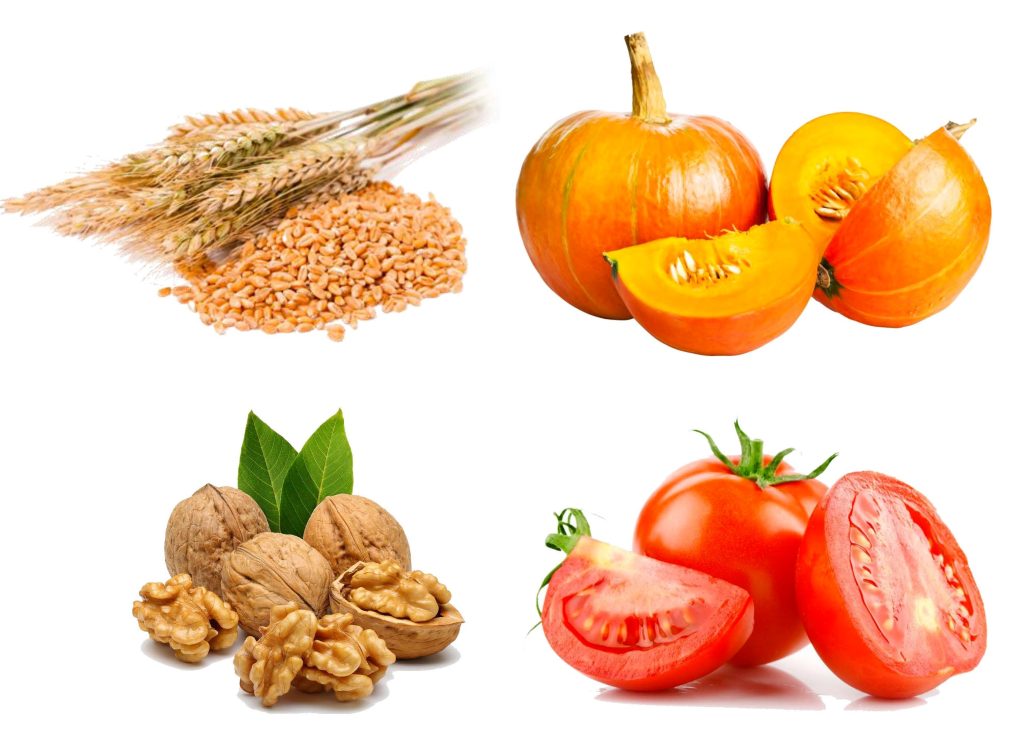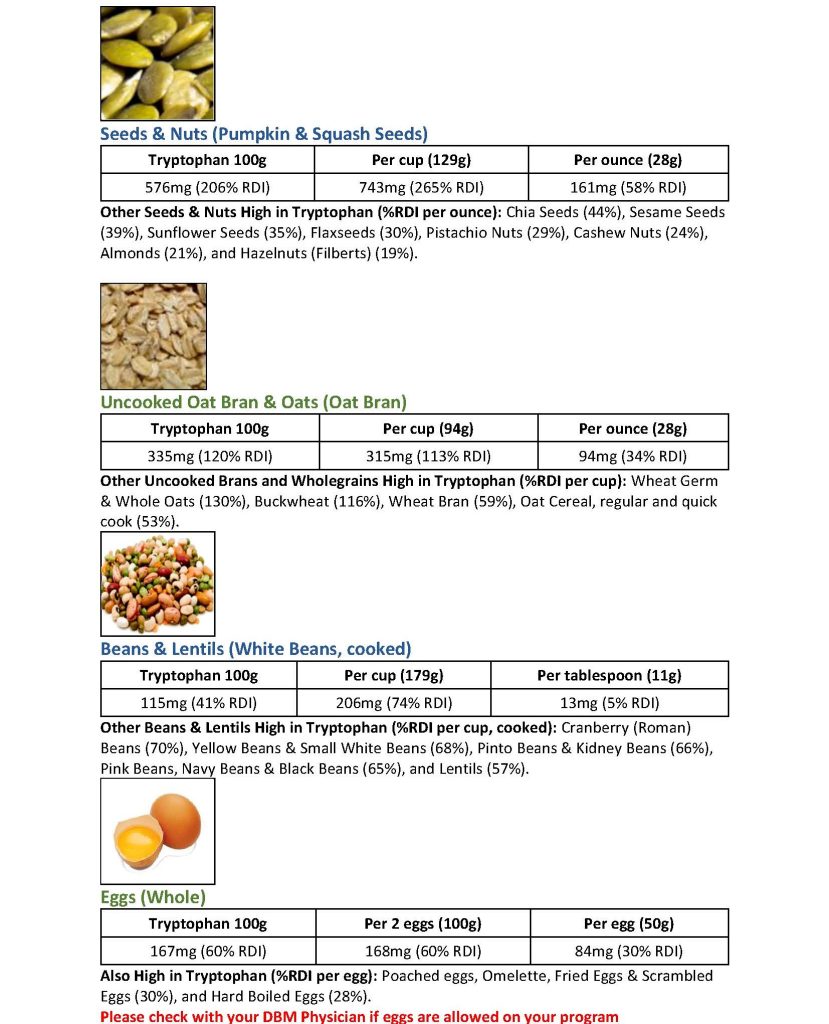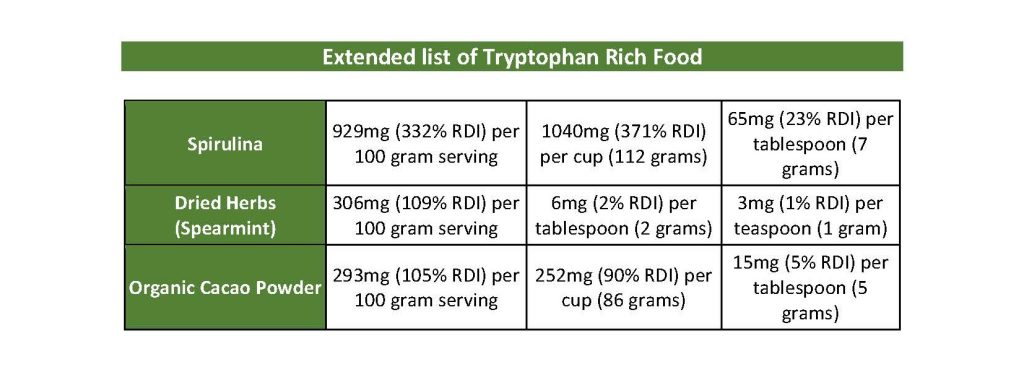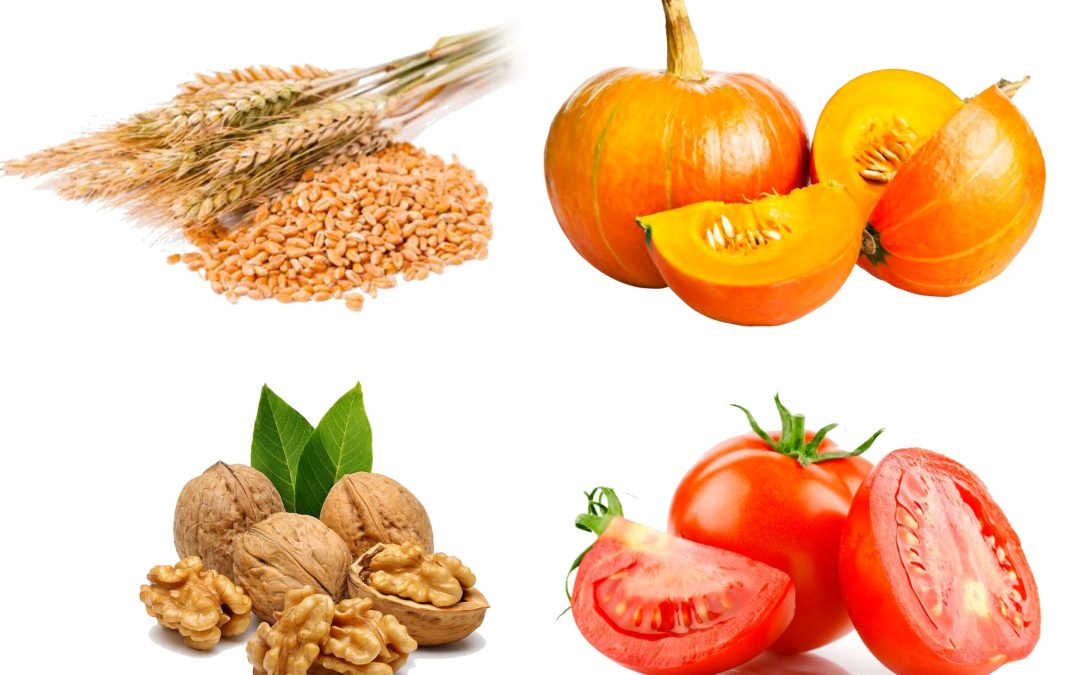| DBM COMMENTPlease check with your DBM Physician / Practitioner if wheat and other grains are permissible on your program |
Wheat
Wheat is a staple food worldwide, this much we know. We also know some people are intolerant to wheat due to gluten allergies. For those tolerant, wheat contains a good amount of amino acids, including T. In conclusion, wheat contains 0.011 grams per ounce.
Pumpkin
Pumpkin is one of the most widely grown foods in the world. Pumpkin, which is technically a fruit, is incredibly rich in vital antioxidants and vitamins. Yet another good source of T, pumpkin contains 0.04 grams per ounce.
Potato
Potato is the number one vegetable crop in the world. According to The George Mateljan Foundation, “potatoes are a very good source of vitamin B6 and a good source of potassium, vitamin C, and dietary fiber. Potatoes also contain a variety of phytonutrients that have antioxidant activity.” As well, potatoes also contain a good amount of T; 0.008 grams per ounce.
Walnuts
Walnuts are delicious nuts thought to increase intellectuality… Cool! Walnuts are richer than most all nuts in polyunsaturated fats. The most abundant being an Omega-6 fatty acid called linoleic acid. Walnuts also contain a relatively high % of the healthy Omega-3 fat, alpha-linolenic acid (ALA). Most of all, the health benefits of walnuts include reduction in bad cholesterol, improvement in metabolism, and control of diabetes. As for intellectuality, the high amount of T may be responsible; walnuts contain 0.10 grams per ounce.
Cauliflower
Fun fact: 1 serving of cauliflower contains 77% of the recommended daily value of vitamin C. Cauliflower is a great source of protein, fiber and potassium. As with broccoli, cauliflower is a member of the cruciferous family of vegetables. Cauliflower contains many essential amino acid, including T; contains 0.0025 grams per ounce.
Cucumber
With so many applications, it’s no wonder cucumbers are the 4th most cultivated vegetable in the world. A superfood, cucumbers are an excellent source of molybdenum and vitamin K. They are also a good source of vitamin C, potassium, and magnesium. Oh, and ladies, cucumbers contain silica, the nail health-promoting mineral! The amount of T is slightly low; an estimated 0.001 grams per ounce.
Mushroom
Did you know, when exposed to light, mushrooms produce vitamin D? Just like human beings! A variety of mushrooms also contain selenium, which is good for our livers. Moreover, mushrooms boost our immune systems, they’re high in antioxidants, and contain loads of vitamin B2 and B3. Mushrooms typically contain 0.0025 grams per ounce… Low, but still a good source.
Leafy Greens
Leafy greens (or leafy green vegetables) are famous for their antioxidant and anticancer properties. For example, they’re low in fat, high in fiber, and rich in vitamin C and phytochemicals. What does this mean? Leafy greens can reduce the risk of cancer and heart disease… Yes! In addition, they’re also a good source of T; spinach contains 0.008 grams per ounce.
Tomato
Tomatoes are treasures of riches when it comes to their nutritive and antioxidant benefits. For example, tomatoes are an excellent source vitamin C and K. As well, tomatoes are a very good source of dietary fiber, vitamin A and E. Tomatoes are also enriched in terms of T, as it contains 0.001 grams per ounce.
Tryptophan Effects
When it comes to mental health and sleep, tryptophan really is a miracle substance. Studies show tryptophan supplements have numerous benefits, including relieving:
- Depression
- anxiety
- Irritability
- Stress
- Behavioural problems
- Premenstrual syndrome
- Binge eating and carb cravings (thus helping with weight loss)
The reason tryptophan is so powerful is because the body uses it to make serotonin, our “happy hormone” which regulates mood. Because some serotonin gets converted into melatonin, it is also associated with helping sleep. It is impossible to supplement with serotonin itself (even antidepressants don’t boost serotonin production levels; they just prevent serotonin from being absorbed so its effects last longer). You can, however, take tryptophan in order to naturally boost serotonin levels. Some of that serotonin is then used to make melatonin, which helps regulate sleep.
To give you an idea of how powerful tryptophan supplements are, consider these study results. In one study where 1000mg of tryptophan supplements was given to “quarrelsome” adults 3x per day, the subjects became more agreeable. When aggressive 10-year old boys were given 500mg of tryptophan supplements per day, they stopped getting so angry when provoked. By contrast, low levels of tryptophan are shown to induce depression, irritability, aggression, and other mood problems. As for sleep, even small amounts of tryptophan are shown to increase the quality of sleep and alleviate insomnia. (Source)
Getting the Benefits of Tryptophan
If you read through the tryptophan studies, you’ll see that all of the amazing benefits of tryptophan are linked to taking tryptophan supplements, and not natural sources of tryptophan from food.
But what about all those hyped-up claims that turkey helps you sleep? The real reason people feel sleepy after Thanksgiving probably has nothing to do with turkey and tryptophan, but rather because they ate too much. When you eat a lot of carbs (especially sugary ones like dessert), it produces a surge of serotonin in the brain which can make you feel happy and sleepy. Plus, your body has to use a lot of energy to digest all of those calories you consumed, which puts you into a coma-like stupor. Consider that the average Thanksgiving dinner has 4,500 calories. That is a lot for your body to digest!
In reality, when you eat tryptophan foods, most of that tryptophan is getting incorporated into tissue proteins or converted into other substances like niacin (source). Tryptophan from foods simply isn’t very good at getting to our brains.
As Scientific American explains, when you eat tryptophan foods, the tryptophan does get into the blood. To get to the brain, it needs to be transported by special proteins across the blood-brain barrier. The problem is that other amino acids are also competing for these transport proteins. The other amino acids are more adept at getting to those transport proteins and tryptophan has a hard time getting from the blood to the brain.
How to Get More Tryptophan from Food
Since tryptophan competes with other amino acids to get to the brain, eating tryptophan foods aren’t going to have a dramatic effect on your mood or sleepiness. But there is an interesting exception: Eating tryptophan foods with carbohydrates can help more tryptophan get to the brain.
When you eat carbs, your body produces insulin. Insulin causes some amino acids to be absorbed into tissues, but it doesn’t have much of an effect on tryptophan. As a result of the insulin, there are fewer competing amino acids and more tryptophan from foods can get to the brain. The American Nutrition Association points to numerous studies which show that eating tryptophan foods as part of a low-protein high-carb diet can improve mood and sleep (vegetarians seem to have an edge here). There are also some cofactors which can help convert tryptophan into serotonin.
Tryptophan Cofactors:
- Iron
- Magnesium
- Vitamin B6
- Vitamin C
Finally, we now know that cytokines degrade tryptophan. Cytokines are pro-inflammatory proteins involved in the immune response. They are released when we are sick, and also in response to certain foods, like saturated fats and trans fats. There are some proven ways to reduce cytokine levels, including getting more Omega 3, eating antioxidant-rich foods, reducing saturated fat intake, and getting more fiber. Again, vegetarians seem to have an edge here. This might be another reason vegetarianism is linked to better mood.
Conclussion:
Simply eating foods high in tryptophan isn’t going to help mood or sleep. To get the most of tryptophan from food, you need to:
- Eat tryptophan foods with some carbs
- Consume tryptophan cofactors (iron, vitamin C, vitamin B6 and magnesium)
- Reduce cytokine levels which degrade tryptophan (eat more antioxidant and fibre-rich foods, avoid saturated and transfats
Tryptophan Supplements
A tryptophan supplement isn’t going to compensate for poor lifestyle, like your junk-food diet, lack of exercise, or the fact that you spend the 3 hours before going to sleep on the couch watching a marathon of Game of Thrones. But, if you really think you need an extra boost of serotonin and help falling asleep, then tryptophan supplements might be an option.
Note that there was a tryptophan supplement scare in the late 80s/early 90s when the supplement was linked to the disease eosinophilia-myalgia syndrome, and subsequently all tryptophan supplements were recalled by the FDA. It was later found that the disease was not caused by tryptophan itself, but because the supplements had been contaminated. Today, contamination errors have been corrected and tryptophan supplements are considered safe, though pregnant and breastfeeding women should still consult with their doctors before taking tryptophan.
In South Africa, tryptophan is no longer available OTC, BUT it is still DBMs preference to obtain tryptophan through NATURAL SOURCES, so take a look at the tables alongside:
- Natural Sources of Tryptophan – Table 1
- Extended List of Tryptophan-Rich Foods







